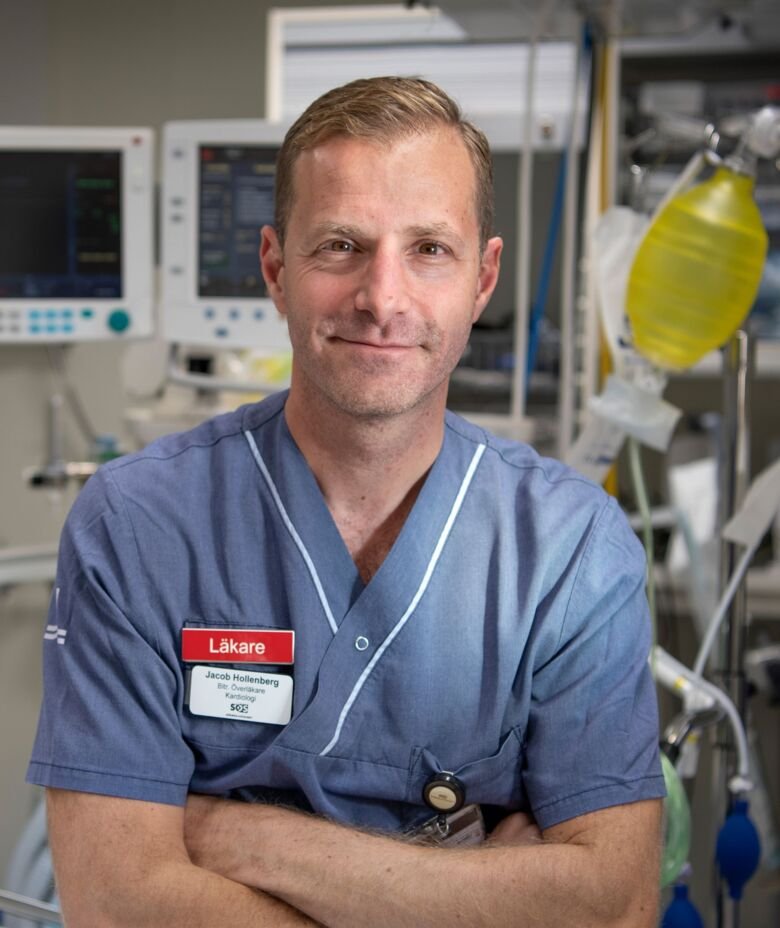New life-saving methods for cardiac arrest
Jacob Hollenberg conducts research to increase the survival rate after cardiac arrest. He leads the KI Center for resuscitation science, which develops and studies new innovative methods and treatments along the entire cardiac care pathway.

What are you researching?
“My research is about how we can save the lives of more people who suffer cardiac arrest. Almost 10,000 cardiac arrests occur annually in Sweden, and only one in ten survive. I head the multi-regional Center for resuscitation science, which is a research group that develops and studies innovative treatments and strategies along the entire chain of care and treatment.”
What does this entail?
“That our research covers everything from initial collapse, via people calling the emergency dispatch centre and performing CPR, to the care in the ambulance, at the emergency department, in intensive care and on the wards. Much of our work concerns developing and evaluating ways of providing treatment more quickly. One example is equipping the police and fire-fighters with defibrillators and involving them in the chain of treatment. Today, the system has been implemented in almost the whole country, as well as abroad. We’ve also created and evaluated a new mobile phone technology and app where lay volunteer life-savers are alerted by text messages to nearby cardiac arrests. There’s been a lot of interest for this initiative, and today 250,000 volunteers have joined the project in the Nordic region. More recently, we have developed a world-unique solution that involves delivering defibrillators by drone. We’re also researching whether a simplified CPR method can improve survival, if AI support for emergency dispatch operators can help to speed up the identification of cardiac arrest and whether immediate cooling of the brain in the event of a cardiac arrest can protect the brain. We also perform hospital-based cardiac arrest studies where we study if new drugs, immediate coronary angiography or ECMO can increase survival.”
What’s the next step for you?
“Our most important next step is to continue with our large portfolio of cardiac arrest research and to make sure that it brings about actual changes in clinical practice, as we have done in the past, which I am very proud of. We’ll also be extending the group’s focus to cover other types of intensive care, emergency cardiology and drowning.”
Text: Anders Nilsson, in translation from Swedish
First published in the booklet ‘From Cell to Society 2022’
About Jacob Hollenberg
Professor of Cardiology specialising in Intensive Care at the Department of Clinical Science and Education, Södersjukhuset
Jacob Hollenberg was born in Stockholm in 1978. He graduated with a degree in medicine at KI in 2003, since when he has concentrated his clinical work to Södersjukhuset. He was an intern doctor between 2003 and 2005, becoming a specialist in internal medicine in 2010 and cardiology in 2011. He is currently head of research and senior consultant at the medical intensive care unit, Södersjukhuset, where he works clinically.
Hollenberg earned his PhD from KI in 2008 and was made docent in 2015. Amongst other honours, he has been awarded Prince Daniel’s major grant from the Heart-Lung Foundation for 2020-2022 and several prizes, especially for the “mobile phone dispatch of laypersons” project.
Jacob Hollenberg was appointed Professor of Cardiology specialising in Intensive Care at Karolinska Institutet on 1 February 2022.
